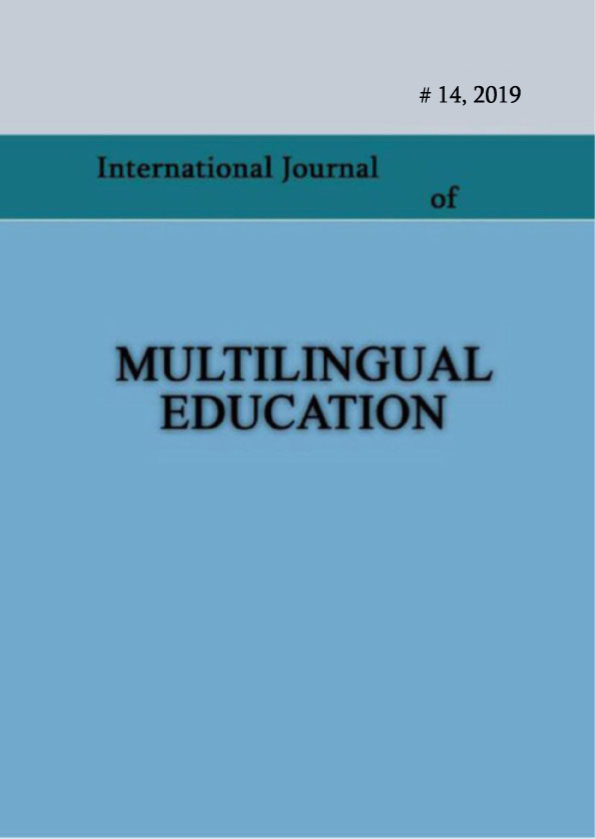Gender Issue in Georgian General Education Institutions
Keywords:
Gender, sensitivity, teachers, students, parents, Adjara RegionAbstract
Gender Equality is one of the principles of functioning democratic society. It is clear that this principle should be integrated into the education system itself. Georgia, as in the State, has taken on commitment to establishing gender equality in the education system in recent years. “The Georgian Law on Gender Equality” (Chapter 2, Article 6) separates the equality guarantees in relation with education. “The State Action Plan for Gender Equality” determines the whole spectrum of measures for achieving gender equality in education. However, everyday practice is far from the desirable situation because of not understanding equality principles. The school, as one of the most important institutions of gender socialization, can create the conditions for the development of children of both sexes, as well as it can become the factor of the gender inequality and transmission. Gender inequality within the education system can be seen in the aspects such as education policy and development strategy, institutional aspects, educational programs and content of textbooks, teaching approaches, assessment forms, organizing physical environment, etc. Of course, it is of great importance that the gender-character of formal and informal relations of the subjects involved in the education process, i.e. the specificity of relations among teachers, administration and pupils. The study provides an analysis of teacher behavior, gender attitudes and stereotypes towards the children of different sexes as well as the gender sensitivity of teachers, pupils and parents in Georgian educational space.
References
Bennett, C. I. (2011). Comprehensive Multicultural Education. Theory and Practice. 7th ed., earson.
Constitution of Georgia. Retrieved on February 12, 2019, http://parliament.ge/ge/
Gender Equality in Georgia: Barriers and Recommendations (2018). Part I. The parliament of Georgia.
Gender Assessment (2014). Research Report. Austrian Development Cooperation. World Vision Georgia.Gorgadze, N. (2015). Gender Education in Primary School. TSU.
Gudashvili, G., Akhvlediani, M., Goliadze, N., Gogishvili, N., Kartvelishvili, T., Matsaberidze, S., Shulaia, A. (2015) The gender role of women in society. Tbilisi. Civic Engagement Center.
Ifegbesan, A. (2010). Gender-Stereotypes Belief and Practices in the Classroom: The Nigerian Post-Primary School Teachers’. Global Journal of Human Social Science. Vol.10 (4) pp.29-38.
Isakadze. T., Gvianishvili, N. (2014). Research on teachers' knowledge and attitudes about gender equality. Research Report. Training and Research Group Tbilisi.
Law of Georgia on Gender Equality (2010). Retrieved 18.08.2019 from https://matsne.gov.ge/ka/document/view/91624?publication=8.
Law of Georgia on General Education. Retrieved on February 05, 2019, http://mes.gov.ge/ Lee, A. (2018). Gender: Your Guide. A Gender-Friendly Primer on What to Know, What to Say, and What to Do in the New Gender Culture. Adams Media.
Miller, C. F. (2016). Gender Development, Theories of. Arizona State University. Retrieved 15.05.2019 from https://www.researchgate.net/publication/315785215_Gender_Development_Theori es_of National Curriculum, 2018-2024. Retrieved on March 15, 2019, http://ncp.ge/ge/curriculum/satesto-seqtsia/akhali-sastsavlo-gegmebi-2018- 2024/datskebiti-safekhuri-i-vi-klasebi-damtkitsda-2016-tsels
Public Attitudes on Gender Equality in Politics and Business (2013). Research Report. UNDP. Georgia.
Sumbadze, N. (2006). Gender and Society – Georgia. Tbilisi.
Stromquist, N. P. (2007). The Gender Socialization Process in Schools: A Cross-National Comparison. UNESCO.
Statistical Yearbook of Georgia. (2018). Statistical Publication. National Statistic Office of Georgia. www.geostat.ge
Strategy for Georgia. European Bank for Reconstruction and Development. As approved by the Board of Directors on 14 December, (2016). file:///D:/Documents/Desktop/Georgia%20Country%20Strategy%20-%20English.pdf)
The UN Convention (2014). Elimination of All Forms of Discrimination against Women. Ratified by the Parliament of Georgia. Decree N 561. 22.09.
Transforming Our World: The 2030 Agenda for Sustainable Development. Resolution adopted by the General Assembly on 25 September 2015. A/RES/70/1 Retrieved 1.05.2019 from www.un.org/ga/search/view_doc.asp?symbol=A/RES/70/1&Lang=E)
Tabatadze, Sh., Gorgadze, N. (2014). Research on Intercultural Education Aspects of Elementary Schools in Georgia. Tbilisi.
Teacher professional standard. Retrieved on April 17, (2019). http://tpdc.gov.ge/geo/
Weis, L. (1989). Class, Race, & Gender in American Education. Albany: State University of New York Press.
Published
How to Cite
Issue
Section
License
Copyright (c) 2019 Madona Mikeladze, Inga Shamilishvili

This work is licensed under a Creative Commons Attribution-NonCommercial 4.0 International License.
Copyright (c) - Authors who publish with this journal agree to the following terms: Authors retain copyright and grant the journal the right of first publication with the work simultaneously licensed under a Creative Commons Attribution-Noncommercial 4.0 International License, which allows others to share the work with an acknowledgement of the work's authorship and initial publication in this journal. Authors are permitted and encouraged to post their work online (e.g., in institutional repositories or on their personal website) prior to and during the submission process, as it can lead to productive exchanges, as well as earlier and greater citation of published work (see The Effect of Open Access). Authors may enter into separate, additional contractual arrangements for the non-exclusive distribution of the journal's published version of the work (e.g., post it to a repository or publish it in a book), with an acknowledgement of its initial publication in this journal.

